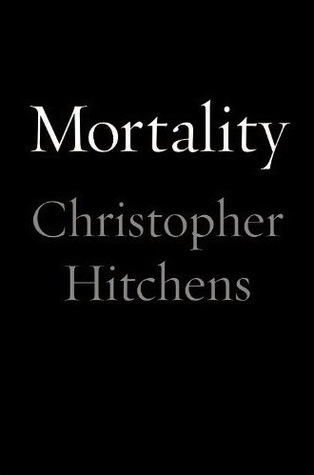Philip's Reviews > Mortality
Mortality
by

by

Hitchens writes: "If I convert it's because it's better that a believer dies than that an atheist does." -pg. 91.
There's no denying the integrity in his life, nor the intellect and wit in his speaking and writing.
But what can I make of this book? It was an easy enough read, but the fact that we're approaching the topic from two diametrically opposed worldviews made it challenging. Is it enough that we respect one another, or give some semblance of respect?
I've watched Hitchens debate religion and politics a number of times. (On youtube, mind you.) Here he debates his brother or here he debates Dinesh D'Souza - and there are many others worth watching... He's very good, and I believe it's a good idea for Christians to engage with other ideologies - and not for the sake of proselytization, but because we can hardly call ourselves "truth-seekers" if we refuse to acknowledge or investigate criticisms of our beliefs.
Mortality is a book about death, cancer, and God. In it, Hitchens is at once provocative, inquisitive, irreverent, and stubborn. (Perhaps he would choose the word "stead-fast.")
And (from my own world-view) is it wrong that I found it both admirable and tragic that he maintained his beliefs through his death? I'm sure many in my theological camp would be appalled by the remark - perhaps likening it to an unrepentant child rapist who refuses to admit he was wrong. There's nothing admirable about that.
But as a Christian, I also believe in a just God - an incomprehensible God. And I hope that when my atheist friends contemplate my beliefs - beliefs that seem completely inconsistent with their view of the world - well, I hope they make allowances for me as well.
There's no denying the integrity in his life, nor the intellect and wit in his speaking and writing.
But what can I make of this book? It was an easy enough read, but the fact that we're approaching the topic from two diametrically opposed worldviews made it challenging. Is it enough that we respect one another, or give some semblance of respect?
I've watched Hitchens debate religion and politics a number of times. (On youtube, mind you.) Here he debates his brother or here he debates Dinesh D'Souza - and there are many others worth watching... He's very good, and I believe it's a good idea for Christians to engage with other ideologies - and not for the sake of proselytization, but because we can hardly call ourselves "truth-seekers" if we refuse to acknowledge or investigate criticisms of our beliefs.
Mortality is a book about death, cancer, and God. In it, Hitchens is at once provocative, inquisitive, irreverent, and stubborn. (Perhaps he would choose the word "stead-fast.")
And (from my own world-view) is it wrong that I found it both admirable and tragic that he maintained his beliefs through his death? I'm sure many in my theological camp would be appalled by the remark - perhaps likening it to an unrepentant child rapist who refuses to admit he was wrong. There's nothing admirable about that.
But as a Christian, I also believe in a just God - an incomprehensible God. And I hope that when my atheist friends contemplate my beliefs - beliefs that seem completely inconsistent with their view of the world - well, I hope they make allowances for me as well.
Sign into Goodreads to see if any of your friends have read
Mortality.
Sign In »
Reading Progress
April 6, 2013
–
Started Reading
April 6, 2013
– Shelved
April 13, 2013
– Shelved as:
memoirs
April 13, 2013
– Shelved as:
non-fiction
April 13, 2013
–
Finished Reading
Comments Showing 1-1 of 1 (1 new)
date newest »
newest »
 newest »
newest »
message 1:
by
Reese
(new)
-
added it
Apr 14, 2013 10:26AM
 Amen.
Amen.
reply
|
flag


